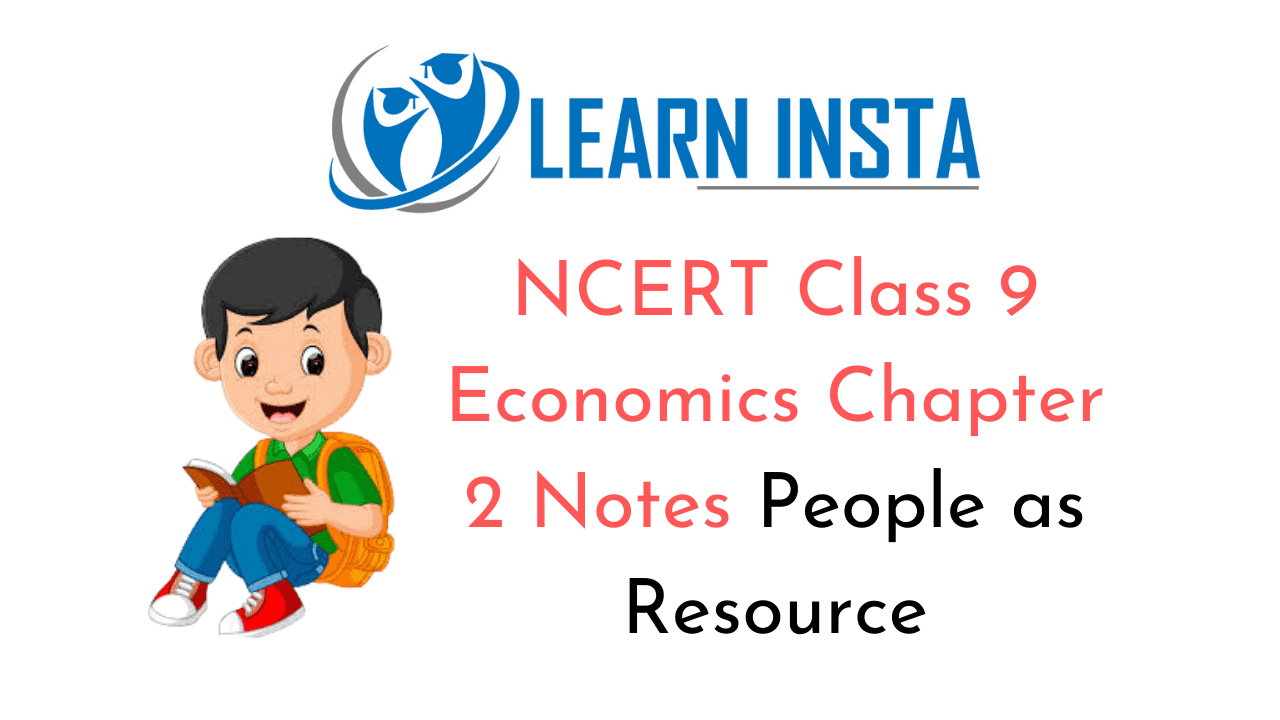
On this page, you will find NCERT Class 9 Economics Chapter 2 Notes Pdf free download. CBSE Class 9 Social Science Notes Economics Chapter 2 SST People as Resource will seemingly, help them to revise the important concepts in less time.
People as Resource Class 9 Notes Social Science Economics Chapter 2
CBSE Class 9 Economics Chapter 2 Notes Understanding the Lesson
1. Population becomes human capital when there is investment made in the form of education, training and medical care. Human capital is the stock of skill and productive knowledge.
2. Higher incomes are earned because of the higher productivity of the more educated or the better-trained persons, as well as the higher productivity of healthier people. Society also gains indirectly because the advantages of a more educated or a healthier population spreads to those also who themselves were not directly educated or given health care.
3. Human capital is superior to other resources like land and physical capital because it is human resource that can make use of land and capital. The large population of India can be turned into a productive asset by investment in human capital.
4. Investment in human resource via education and medical care can give high rates of return in the future in the form of higher earnings and greater contribution to society. Countries like Japan have invested in human resources. They did not have any natural resources. These countries are developed countries because they have invested on people especially in the field of education and health.
5. People have been engaged in various economic activities which have been classified into three main sectors-primary, secondary and tertiary. Primary sector includes agriculture, forestry, animal husbandry, fishing, etc. Secondary sector includes manufacturing. Trade, transport, communication, tourism, etc. come under tertiary sector.
6. Economic activities are also called market activities as they involve remuneration. Non-market activities are the production for self-consumption. The earning of any individual in the market depends mainly on education and skill. Since a majority of women lack good education and skill so they are paid low compared to men.
7. The quality of population depends upon the literacy rate, health of a person, indicated by life expectancy and skill formation acquired by the people of the country. The quality of the population ultimately decides the growth rate of the country. Educated and healthy people are an asset.
8. Education is an important input for the growth of an individual. Education also contributes towards the growth of society. It enhances the national income, cultural richness and increases the efficiency of governance. Sarva Siksha Abhiyan is a significant step towards providing elementary education to all children in the age group of six to fourteen years.
9. The health of a person helps him to realise his potential and the ability to fight illness. An unhealthy person becomes a liability. So, improvement in health status of the population has the priority of the country.
10. Unemployment is a big problem in our country. In rural areas, there is seasonal and disguised unemployment. Urban areas have mostly educated unemployment.
11. Unemployment leads to wastage of manpower resource. People who are an asset for the economy turn into a liability. Unemployment tends to increase economic overload. The dependence of the unemployed on the working population increases. The quality of life of an individual as well as society is adversely affected.
12. The employment structure is characterised by self-employment in the primary sector. Agriculture is the most labour absorbing sector of the economy. In recent years there has been a decline m the dependence of population on agriculture. Some of the surplus-labour in agriculture has moved to either the secondary or tertiary sector.
People as Resource Class 9 CBSE Notes Important Terms
Population: All the inhabitants of a particular place.
Human Capital: The stock of skill and productive knowledge embodied in people.
Investment: Purchase of goods that are not consumed today but are used in future to create wealth.
Physical Capital: Wealth in the form of money or other assets owned by a person or organization.
Liability: A person or thing whose presence or behaviour is likely to put one at a disadvantage.
Vocational Education: Educational training that provides practical experience in a particular occupational field, agriculture home economics, industry.
Illiterate: One who is unable to read or write.
Asset: A useful or valuable thing or person.
Elementary education: A period of formal education following pre-school but before high school.
Life expectancy: The average period that a person may expect to live.
Subsistence level: A standard of living or wage that provides only the bare necessities of life.
Biotechnology: The exploitation of biological processes for industrial and purposes, especially the genetic manipulation micro-organisms for the production of antibiotics, hormones, etc.
Surplus: An amount of something left over when requirements have been met.